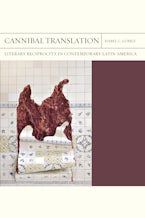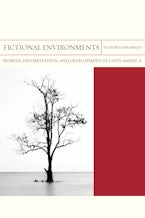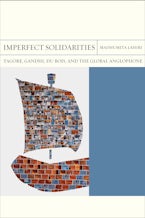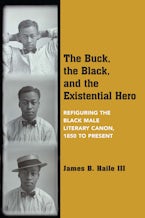LITERARY CRITICISM / Comparative Literature
Showing results 1-10 of 21
Filter Results OPEN +

Dwelling in Fiction
This study offers new insights into notoriously difficult texts from Latin America and calls attention to a previously unrecognized transnational community of thinkers and writers united by a critical regionalist ethos.
Cannibal Translation
This bold comparative study demonstrates the creative potential for translations that embrace reciprocity and resist assimilation. Isabel C. Gómez analyzes the creative translation practices of canonical Latin American writers such as Haroldo and Augusto de Campos, Clarice Lispector, and Octavio Paz.
The Aesthetic Life of Infrastructure
This volume uses literary methods to interpret infrastructure, showing that its aesthetic and sensorial experience cannot be understood apart from its histories of production and political economies.
Colorblind Tools
Offering a transnational account of anti-Blackness and white supremacy that pushes against the dominant emphasis on change that pervades current racial theory, Marzia Milazzo demonstrates that colorblindness is neither new nor a subtype of racist ideology, but a constitutive technology of racism.
How to Read a Moment
This book examines works by authors like Don DeLillo, Jennifer Egan, Charles Yu, and Colson Whitehead to show that the contemporary American novel offers new ways to make sense of the temporality that governs our contemporary world.
Fictional Environments
Fictional Environments: Mimesis, Deforestation, and Development in Latin America investigates how fictional works have become sites for the production of knowledge, imagination, and intervention in Latin American environments.
Imperfect Solidarities
Imperfect Solidarities: Tagore, Gandhi, Du Bois, and the Global Anglophone theorizes print internationalism, which creates new terms within the worldwide hegemony of the English language to encourage alternate geographies and collectivities.
The Nigrescent Beyond
This book is a study on the vanishing of blackness in Mexico and its relation to the United States and black studies in general.
Identity, Mediation, and the Cunning of Capital
This book explores the role that identity politics plays in capitalism, in particular the ways in which capitalism thrives by fragmenting identity through multiple modes of mediation.
The Buck, the Black, and the Existential Hero
The Buck, the Black, and the Existential Hero: Refiguring the Black Male Literary Canon, 1850 to Present develops a theory of the black male literary imagination.

Dwelling in Fiction
This study offers new insights into notoriously difficult texts from Latin America and calls attention to a previously unrecognized transnational community of thinkers and writers united by a critical regionalist ethos.
Cannibal Translation
This bold comparative study demonstrates the creative potential for translations that embrace reciprocity and resist assimilation. Isabel C. Gómez analyzes the creative translation practices of canonical Latin American writers such as Haroldo and Augusto de Campos, Clarice Lispector, and Octavio Paz.
The Aesthetic Life of Infrastructure
This volume uses literary methods to interpret infrastructure, showing that its aesthetic and sensorial experience cannot be understood apart from its histories of production and political economies.
Colorblind Tools
Offering a transnational account of anti-Blackness and white supremacy that pushes against the dominant emphasis on change that pervades current racial theory, Marzia Milazzo demonstrates that colorblindness is neither new nor a subtype of racist ideology, but a constitutive technology of racism.
How to Read a Moment
This book examines works by authors like Don DeLillo, Jennifer Egan, Charles Yu, and Colson Whitehead to show that the contemporary American novel offers new ways to make sense of the temporality that governs our contemporary world.
Fictional Environments
Fictional Environments: Mimesis, Deforestation, and Development in Latin America investigates how fictional works have become sites for the production of knowledge, imagination, and intervention in Latin American environments.
Imperfect Solidarities
Imperfect Solidarities: Tagore, Gandhi, Du Bois, and the Global Anglophone theorizes print internationalism, which creates new terms within the worldwide hegemony of the English language to encourage alternate geographies and collectivities.
The Nigrescent Beyond
This book is a study on the vanishing of blackness in Mexico and its relation to the United States and black studies in general.
Identity, Mediation, and the Cunning of Capital
This book explores the role that identity politics plays in capitalism, in particular the ways in which capitalism thrives by fragmenting identity through multiple modes of mediation.
The Buck, the Black, and the Existential Hero
The Buck, the Black, and the Existential Hero: Refiguring the Black Male Literary Canon, 1850 to Present develops a theory of the black male literary imagination.










